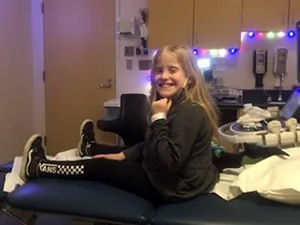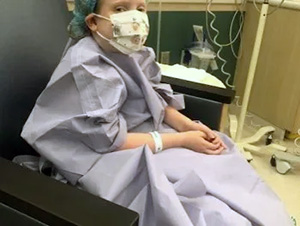Improving Urologic Outcomes for Newborns and Young Children With Spina Bifida
November 2, 2022
From the On the Pulse blog of Seattle Children’s, by Ashley Speller
Researchers at the Centers for Disease Control and Prevention (CDC) have teamed up with clinicians at Seattle Children’s to identify and evaluate the best urologic management for newborns and young children with spina bifida in a nationwide study called Urologic Management to Preserve Initial REnal function (UMPIRE).
Launched in 2014, the multisite, multiyear UMPIRE program aims to increase the understanding of kidney, bladder health and function, which are closely linked, in the early years. It also brings together a unique collaboration of doctors and nurses from more than 20 clinics across the country, including Seattle Children’s Urology Program, which has been ranked among the top 10 pediatric urology programs in the United States for the past three years by U.S. News & World Report.
 Ten-year-old Stella is a patient at Seattle Children’s
Ten-year-old Stella is a patient at Seattle Children’s
“Spina bifida is a common birth defect where part of the spine doesn’t form properly,” said Dr. Jennifer Ahn, an attending pediatric urologist at Seattle Children’s and an assistant professor in the University of Washington’s Urology Department. “Kids with spina bifida typically have abnormal bladder function due to improper development of the spinal cord and nerves that control the bladder. This can impact kidney growth and function, as well as urinary continence and quality of life.”
As part of the UMPIRE program, clinicians like Dr. Ahn, who is principal investigator of the Seattle location, follow a group of newborns and infants up to 3 months old until they are 10 years old to track their long-term kidney and bladder health, analyze data and publish findings on the best standard of care to protect the kidneys.
Dr. Ahn says having a spinal defect can present lifelong issues, including bladder, kidney or bowel concerns; lower extremity functions that may require a wheelchair or a device to help them walk; or even a shunt that drains fluid in the brain to prevent buildup. In addition, she notes that abnormal bladders that are not working well or treated appropriately can potentially lead to kidney problems and eventually kidney failure, so this ongoing work around bladder health is particularly significant in determining the needs of each child.
Ten-year-old Stella has been one of Dr. Ahn’s patients for five years and was born with the most severe form of spina bifida, affecting her entire body from head to toe.
 Stella, pictured as a baby, was born with spina bifida, a condition that affects her kidneys and bladder.
Stella, pictured as a baby, was born with spina bifida, a condition that affects her kidneys and bladder.“She had her spinal surgery the morning after she was born,” said Stella’s mom, Melissa Abraham. “Spina bifida impacts her spine and muscles in her legs. She has had surgical intervention with her feet, walks with braces and uses her wheelchair, which gives her freedom to enjoy the community without tiring out as often.”
Stella, who was not part of the UMPIRE study, travels with her family from Bellingham to receive specialized care at Seattle Children’s and has had the most intervention on her kidneys and bladder.
Prone to infections and spasms, her quality of life had been significantly affected until 2021, when Dr. Ahn performed a life-changing kidney and bladder procedure on Stella.
Stella Abraham and her family travel from Bellingham to Seattle to receive specialized care at Seattle Children’s
“Ever since the surgery, her health has improved leaps and bounds,” said Melissa. “Stella now has a healthy bladder and kidneys and has so much independence in her self-care. She can go to sleepovers, playdates and summer camp without needing a parent there. She has dealt with many health difficulties and complex healthcare needs, but we always know she is in good hands.”
 Stella Abraham and her family travel from Bellingham to Seattle to receive specialized care at Seattle Children’s.
Stella Abraham and her family travel from Bellingham to Seattle to receive specialized care at Seattle Children’s.Melissa says she and her family are appreciative of the ongoing work and research being done by Dr. Ahn and the urology team at Seattle Children’s in improving lives for kids like Stella.
“UMPIRE was created to try to understand what the best urologic management is for newborns and young children with spina bifida, with the primary goal of preserving renal function,” Dr. Ahn explained.
Throughout the course of the study, each enrolled patient, no matter the location, receives similar care on the same schedule.
“Experts from each site come together to determine what the ideal urologic management for kids with spina bifida is as soon as they are born — for example, how proactive we need to be with bladder catheterization or medications, how often we get imaging studies and what the results mean — we constantly evaluate our results and make improvements accordingly.”
Dr. Ahn has been part of the study for nearly five years. She’s proud to be part of this innovative group of experts who are at the forefront of this field working to better understand what the optimal care for young children with spina bifida is.
 Dr. Jennifer Ahn
Dr. Jennifer Ahn
Today, several of the children who joined UMPIRE as babies are getting ready to turn 7 years old, and everything doctors have learned from them has the potential to impact all kids in this population.
“It’s important that we’re one of the several sites that is very involved in trying to tackle this issue,” Dr. Ahn said. “Since we have started this study, centers around the country who aren’t involved are seeing what we are doing, taking our cues and following many of our protocols. For me, it’s critical that we be a part of these discussions and this work.”
Resources:
- Urology – Seattle Children’s
- Department of Urology (washington.edu)
- U.S. News & World Report Rankings
- Urologic Management to Preserve Initial Renal Function Protocol for Young Children with Spina Bifida (UMPIRE) | CDC
- Spina Bifida Clinic Map | Spina Bifida | NCBDDD | CDC
- PE056 Spina Bifida
- PE056S Spina Bifida – Spanish